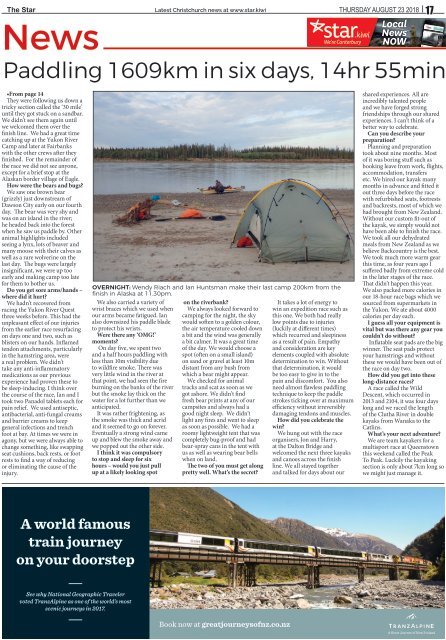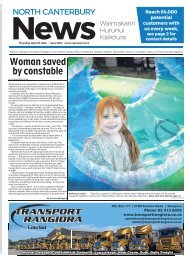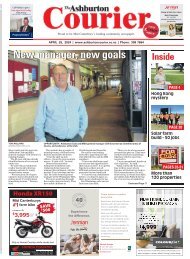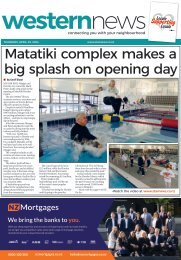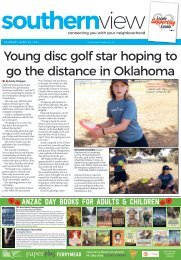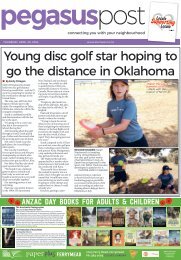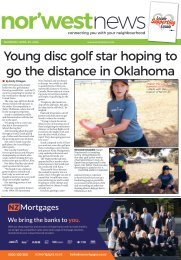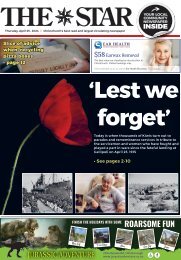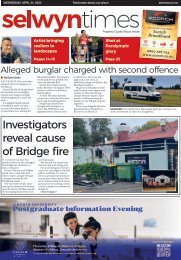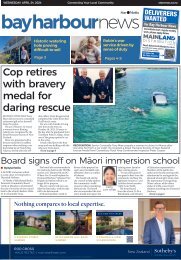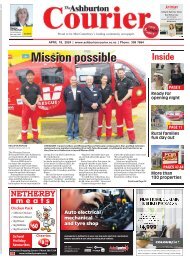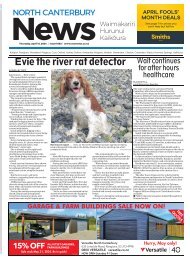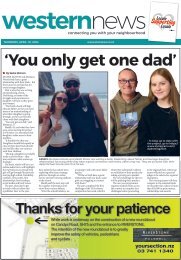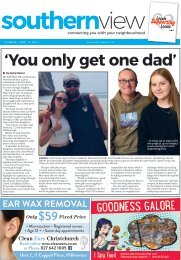The Star: August 23, 2018
Create successful ePaper yourself
Turn your PDF publications into a flip-book with our unique Google optimized e-Paper software.
<strong>The</strong> <strong>Star</strong> Latest Christchurch news at www.star.kiwi<br />
17<br />
News<br />
Thursday <strong>August</strong> <strong>23</strong> <strong>2018</strong><br />
Local<br />
News<br />
Now<br />
Paddling 1609km in six days, 14hr 55min<br />
Fire rages, homes at risk<br />
•From page 14<br />
<strong>The</strong>y were following us down a<br />
tricky section called the ‘30 mile’<br />
until they got stuck on a sandbar.<br />
We didn’t see them again until<br />
we welcomed them over the<br />
finish line. We had a great time<br />
catching up at the Yukon River<br />
Camp and later at Fairbanks<br />
with the other crews after they<br />
finished. For the remainder of<br />
the race we did not see anyone,<br />
except for a brief stop at the<br />
Alaskan border village of Eagle.<br />
How were the bears and bugs?<br />
We saw one brown bear<br />
(grizzly) just downstream of<br />
Dawson City early on our fourth<br />
day. <strong>The</strong> bear was very shy and<br />
was on an island in the river;<br />
he headed back into the forest<br />
when he saw us paddle by. Other<br />
animal highlights included<br />
seeing a lynx, lots of beaver and<br />
many moose with their calves as<br />
well as a rare wolverine on the<br />
last day. <strong>The</strong> bugs were largely<br />
insignificant, we were up too<br />
early and making camp too late<br />
for them to bother us.<br />
Do you get sore arms/hands –<br />
where did it hurt?<br />
We hadn’t recovered from<br />
racing the Yukon River Quest<br />
three weeks before. This had the<br />
unpleasant effect of our injuries<br />
from the earlier race resurfacing<br />
on days one and two, such as<br />
blisters on our hands. Inflamed<br />
tendon attachments, particularly<br />
in the hamstring area, were<br />
a real problem. We didn’t<br />
take any anti-inflammatory<br />
medications as our previous<br />
experience had proven these to<br />
be sleep-inducing. I think over<br />
the course of the race, Ian and I<br />
took two Panadol tablets each for<br />
pain relief. We used antiseptic,<br />
antibacterial, anti-fungal creams<br />
and barrier creams to keep<br />
general infections and trench<br />
foot at bay. At times we were in<br />
agony, but we were always able to<br />
change something, like swapping<br />
seat cushions, back rests, or foot<br />
rests to find a way of reducing<br />
or eliminating the cause of the<br />
injury.<br />
OVERNIGHT: Wendy Riach and Ian Huntsman make their last camp 200km from the<br />
finish in Alaska at 11.30pm.<br />
We also carried a variety of<br />
wrist braces which we used when<br />
our arms became fatigued. Ian<br />
also downsized his paddle blade<br />
to protect his wrists.<br />
Were there any ‘OMG!’<br />
moments?<br />
On day five, we spent two<br />
and a half hours paddling with<br />
less than 10m visibility due<br />
to wildfire smoke. <strong>The</strong>re was<br />
very little wind in the river at<br />
that point, we had seen the fire<br />
burning on the banks of the river<br />
but the smoke lay thick on the<br />
water for a lot further than we<br />
anticipated.<br />
It was rather frightening, as<br />
the smoke was thick and acrid<br />
and it seemed to go on forever.<br />
Eventually a strong wind came<br />
up and blew the smoke away and<br />
we popped out the other side.<br />
I think it was compulsory<br />
to stop and sleep for six<br />
hours – would you just pull<br />
up at a likely looking spot<br />
on the riverbank?<br />
We always looked forward to<br />
camping for the night, the sky<br />
would soften to a golden colour,<br />
the air temperature cooled down<br />
a bit and the wind was generally<br />
a bit calmer. It was a great time<br />
of the day. We would choose a<br />
spot (often on a small island)<br />
on sand or gravel at least 10m<br />
distant from any bush from<br />
which a bear might appear.<br />
We checked for animal<br />
tracks and scat as soon as we<br />
got ashore. We didn’t find<br />
fresh bear prints at any of our<br />
campsites and always had a<br />
good night sleep. We didn’t<br />
light any fires and went to sleep<br />
as soon as possible. We had a<br />
roomy lightweight tent that was<br />
completely bug-proof and had<br />
bear-spray cans in the tent with<br />
us as well as wearing bear bells<br />
when on land.<br />
<strong>The</strong> two of you must get along<br />
pretty well. What’s the secret?<br />
It takes a lot of energy to<br />
win an expedition race such as<br />
this one. We both had really<br />
low points due to injuries<br />
(luckily at different times)<br />
which recurred and sleepiness<br />
as a result of pain. Empathy<br />
and consideration are key<br />
elements coupled with absolute<br />
determination to win. Without<br />
that determination, it would<br />
be too easy to give in to the<br />
pain and discomfort. You also<br />
need almost flawless paddling<br />
technique to keep the paddle<br />
strokes ticking over at maximum<br />
efficiency without irreversibly<br />
damaging tendons and muscles.<br />
How did you celebrate the<br />
win?<br />
We hung out with the race<br />
organisers, Jon and Harry,<br />
at the Dalton Bridge and<br />
welcomed the next three kayaks<br />
and canoes across the finish<br />
line. We all stayed together<br />
and talked for days about our<br />
shared experiences. All are<br />
incredibly talented people<br />
and we have forged strong<br />
friendships through our shared<br />
experiences. I can’t think of a<br />
better way to celebrate.<br />
Can you describe your<br />
preparation?<br />
Planning and preparation<br />
took about nine months. Most<br />
of it was boring stuff such as<br />
booking leave from work, flights,<br />
accommodation, transfers<br />
etc. We hired our kayak many<br />
months in advance and fitted it<br />
out three days before the race<br />
with refurbished seats, footrests<br />
and backrests, most of which we<br />
had brought from New Zealand.<br />
Without our custom fit-out of<br />
the kayak, we simply would not<br />
have been able to finish the race.<br />
We took all our dehydrated<br />
meals from New Zealand as we<br />
believe Backcountry is the best.<br />
We took much more warm gear<br />
this time, as four years ago I<br />
suffered badly from extreme cold<br />
in the later stages of the race.<br />
That didn’t happen this year.<br />
We also packed more calories in<br />
our 18-hour race bags which we<br />
sourced from supermarkets in<br />
the Yukon. We ate about 4000<br />
calories per day each.<br />
I guess all your equipment is<br />
vital but was there any gear you<br />
couldn’t do without?<br />
Inflatable seat pads are the big<br />
winner. <strong>The</strong> seat pads protect<br />
your hamstrings and without<br />
these we would have been out of<br />
the race on day two.<br />
How did you get into these<br />
long-distance races?<br />
A race called the Wild<br />
Descent, which occurred in<br />
2013 and 2104, it was four days<br />
long and we raced the length<br />
of the Clutha River in double<br />
kayaks from Wanaka to the<br />
Catlins.<br />
What’s your next adventure?<br />
We are team kayakers for a<br />
multisport race at Queenstown<br />
this weekend called the Peak<br />
To Peak. Luckily the kayaking<br />
section is only about 7km long so<br />
we might just manage it.<br />
A world famous<br />
train journey<br />
on your doorstep<br />
See why National Geographic Traveler<br />
voted TranzAlpine as one of the world’s most<br />
scenic journeys in 2017.<br />
Book now at greatjourneysofnz.co.nz


